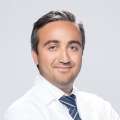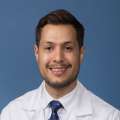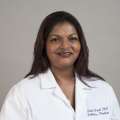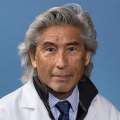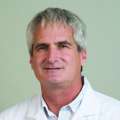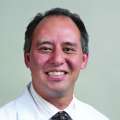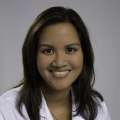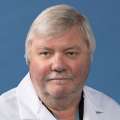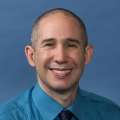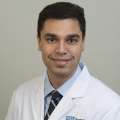Pediatric Neurosurgery
Our pediatric neurosurgeons have led the world in groundbreaking discoveries in many research areas. We offer leading-edge care by continually researching and using the latest techniques in children’s brain surgery.
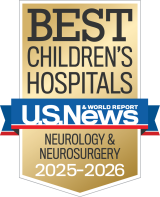

Why Choose UCLA Health for Pediatric Neurosurgery?
The pediatric neurosurgery team at UCLA Health Mattel Children’s Hospital embraces a tradition of excellence. We treat the full range of pediatric neurological disorders and our pediatric neurosurgeons are part of the UCLA Health Department of Neurosurgery, which ranks among the top neurosurgery programs in the country, as listed by U.S. News & World Report.
Highlights of our pediatric neurosurgery program:
Internationally recognized excellence: Our program is a regional, national and international referral center for complex pediatric neurological disorders. Our expert team comprehensively reviews each child’s needs, carefully determining when surgery is the best option.
Research focus: Pediatric neurosurgeons at UCLA Health are also professors at the David Geffen School of Medicine, one of the most prestigious and research-intensive institutions in the world. Our specialists continually study treatments to bring your child the most effective, up-to-date options.
Family-centered care: Our specialists offer comprehensive, compassionate care that values your family as central to your child’s well-being. We encourage family participation in care plans and communicate with you about familial and cultural preferences regarding your child’s health.
Our Pediatric Neurosurgery Areas of Care
The pediatric neurosurgery team works with specialists in multiple programs across UCLA Health. Our specialized services include:
Pediatric Brain Tumor Program
Our children's brain tumor specialists use the most advanced, precise treatments to care for children with brain tumors. To enhance the safety of the surgeries we perform, we adapted virtual reality technology for the operating room, allowing us to rehearse and prepare for surgery in a way that has never before been possible.
Our multispecialty team includes experts in:
- Pediatric neurosurgery
- Pediatric neurology
- Neurodevelopmental care
- Neuro-oncology
- Neuropathology
- Neuroradiology
We are among the leading centers in the world in brain tumor vaccine research and precision medicine in children. As members of the Pacific Pediatric Neuro-Oncology Consortium and the Children’s Oncology Group, we work with other children’s hospitals to expand access to clinical trials. Find out more about our Pediatric Brain Tumor Program.
Pediatric Chiari and Syringomyelia Program
Our specialists offer comprehensive diagnosis and treatment for children with Chiari malformation (brain tissue that extends into the spinal canal) and syringomyelia (a fluid-filled cyst in the spinal cord). We provide state-of-the-art techniques and devices, such as programmable valves to manage syringomyelia or neuroendoscopy for hydrocephalus that causes Chiari malformation. Our team-based approach combines the expertise of specialists in:
- Pediatric neurosurgery
- Pediatric neurology
- Rehabilitation
Pediatric Craniosynostosis Program
Since UCLA Health first opened a dedicated craniofacial clinic in 1972, our providers have continually set and raised the standards of care in treating craniofacial conditions such as craniosynostosis. This condition occurs when one or more gaps between the growing bones of the skull close prematurely. We have an exceptional track record of excellent outcomes, both in terms of a child’s cognitive (thinking) ability and cosmetic appearance after craniofacial surgery.
Our neurosurgeons work closely with multiple specialists to offer individualized, comprehensive care. The team includes surgeons from several specialty areas, including:
- Neurosurgeons
- Plastic surgeons
- Oral surgeons
- Head and neck surgeons
The team also includes the expertise of:
- Audiologists
- Medical geneticists
- Ophthalmologists
- Orthodontists
- Otolaryngologists
- Pediatricians
- Speech pathologists
Pediatric Epilepsy Surgery
Our program is among the highest volume in the world for pediatric epilepsy surgery. We offer the full spectrum of epilepsy procedures using the latest technologies to promote excellent outcomes.
Each week, we hold a multidisciplinary meeting where we discuss the most appropriate treatment strategy for each of our patients. This team includes specialists in:
- Neurosurgery
- Neurology
- Child psychiatry
- Neuropathology
- Neuropsychology
- Nursing
Pediatric Hydrocephalus Program
Our pediatric neurosurgeons use the most advanced techniques to treat hydrocephalus, a buildup of cerebrospinal fluid (CSF) in the brain. We perform a minimally invasive procedure that combines the use of a small camera and tiny tools to reduce CSF buildup. This technique leads to more successful outcomes in children with hydrocephalus.
We are one of the few centers in the nation with the specialized expertise to offer this treatment option. Our hydrocephalus surgery success rates match those of the top pediatric hospitals in the country.
Pediatric Scoliosis Program
This program is a world-class, multidisciplinary service designed to meet your child’s unique needs. We use leading-edge technology to treat abnormal spine curvatures while continually researching and developing new treatments. Whether your child needs a diagnostic X-ray or state-of-the-art surgery, our pediatric scoliosis team can help.
Sports Concussions and Traumatic Brain Injury Program
Our neurosurgeons work closely with neurologists to treat sports concussions and traumatic brain injuries (TBI). We manage these conditions based on guidelines from the American Academy of Neurology, CDC and the international Concussion in Sport Group.
Multiple specialists work together to deliver comprehensive TBI care. Your child may be treated by:
- Pediatric neurosurgeons
- Pediatric neurologists
- Neuropsychologists
- Dietitians
- Occupational therapists
- Sports medicine specialists
To learn more about our services, call 310-825-6196 or email [email protected]
Conditions Pediatric Neurosurgeons Treat
Our pediatric neurosurgeons treat a wide range of brain, spine and nervous system conditions, including:
- Arachnoid cysts: Fluid-filled growths occurring on the arachnoid membrane, which covers the brain and spinal cord
- Brain and spinal cord tumors: An irregular mass of cells starting in the brain or spinal cord, which can be cancerous (malignant) or noncancerous (benign)
- Chiari malformation: A condition in which the bottom portion of the brain (cerebellum) extends into the spine, putting pressure on both the brain and spinal cord
- Craniofacial syndromes: Any condition in which the face or head doesn’t develop typically, including craniosynostosis, a misshapen skull due to skull bones fusing earlier than they should
- Epilepsy: A brain disorder that results from irregular electrical activity in the brain (seizures)
- Hydrocephalus: Fluid buildup in the ventricles (cavities) of the brain
- Moyamoya disease: A rare condition in which blood vessels in the brain narrow or become blocked
- Myelomeningocele: A type of spina bifida occurring when a baby’s spinal cord doesn’t develop properly
- Scoliosis: Irregular sideways curving of the spine
- Spasticity: Irregular stiffening or tightening in the muscles, which interferes with movement
- Syringomyelia: A condition that causes fluid-filled cysts to form in the spinal cord
- Vascular malformations of the brain: Irregular development in the blood vessels of the brain, such as a tangle of blood vessels (arteriovenous malformations)
Treatments pediatric neurosurgeons offer
Our Pediatric Neurosurgeons Offer:
- Baclofen pumps: These small machines are placed underneath the skin on one side of a child’s abdomen. They deliver a medicine called baclofen to the spinal canal to help control spasticity.
- Brachial plexus repair: This surgery repairs the brachial plexus nerves, which carry sensory and movement signals from the spinal cord to the hands and arms.
- Brain tumor resection: The neurosurgeon removes as much of a tumor as possible without damaging surrounding tissue. They often perform a craniotomy, where they remove a section of the skull to access the brain tumor. The neurosurgeon replaces the bone fragment after the tumor is removed.
- Craniectomy: This procedure removes a small portion of the skull to relieve pressure on the brain. Neurosurgeons often use this technique to help decrease brain swelling after a traumatic injury. The bone fragment may be kept and replaced during a future surgery, or the opening may later be reconstructed using artificial bone.
- Craniosynostosis surgery: Our neurosurgeons use multiple surgical techniques to treat craniosynostosis, a condition in which the skull bones fuse too early. The technique we use depends on the child’s age, the type of craniosynostosis involved and whether it’s caused by a genetic syndrome. We typically recommend surgery before the baby turns one. The goal of surgery is to reduce pressure within the skull, create space for the brain to grow and correct the head shape.
- Endoscopic third ventriculostomy with choroid plexus cauterization (ETV/CPC): This procedure combines two operations to treat hydrocephalus in infants. In ETV, the neurosurgeon makes an opening in the third ventricle of the brain to allow cerebrospinal fluid (CSF) to flow normally. In CPC, the neurosurgeon safely removes small portions of the tissue that makes CSF, called the choroid plexus, to reduce the amount of CSF in the brain.
- Hemispherectomy: This rare, complex surgery disconnects or removes one portion (hemisphere) of the brain. It’s an effective epilepsy treatment in select patients.
- Laser interstitial thermal therapy: This minimally invasive surgery may treat brain tumors or epilepsy. During the operation, neurosurgeons use heat to target and destroy tumors or small portions of the brain where seizures occur.
- Posterior fossa decompression: A neurosurgeon performs a suboccipital craniectomy, in which they remove a portion of bone at the back of the head to allow more space for the brain. This procedure treats Chiari malformation by reducing pressure on the cerebellum and spinal cord.
- Responsive neurostimulation: The neurosurgeon places a small device called a neurostimulator in the skull. This device detects when electrical activity in the brain could lead to a seizure. In response, it sends a small electrical pulse to the brain to stop a seizure before it begins.
- Selective dorsal rhizotomy: The surgeon makes incisions in a few of the sensory nerve fibers in the lower spinal canal. Cutting these fibers reduces spasticity in the legs. This operation may be an effective treatment for some children with cerebral palsy.
- Spinal cord detethering: This procedure treats a tethered spinal cord, a condition in which the spinal cord attaches to the spinal column. It’s common in children with spina bifida. Tethering causes the spinal cord to stretch and disrupt blood flow as a child grows. The neurosurgeon makes an incision in the lower back to expose the spinal column. They may remove one or two spinal bones (vertebrae) to better access the spinal cord. Then they gently detach the spinal cord from where it has attached to the spinal column.
- Vagal nerve stimulator: An implanted device sends regular, low electrical impulses to the vagus nerve, one of the nerves in the brain. These electrical impulses help decrease the frequency and severity of seizures.
- Ventriculoperitoneal (VP) shunt: A VP shunt is a small tube placed beneath the skin to drain excess cerebrospinal fluid (CSF) from the brain. This procedure treats hydrocephalus, a condition in which CSF doesn’t drain from the brain as it should. The neurosurgeon places one end of the shunt in the brain and the other end in the hollow space in the abdomen (peritoneal cavity). When CSF builds in the brain, it drains through the shunt, gets filtered by the kidneys and leaves the body in urine.
Meet Our Team
Our pediatric neurosurgeons use advanced, leading-edge techniques to offer your child the best chances of an optimal outcome. We have achieved national and international recognition for our expertise in research and clinical care.
Clinical Faculty
Advanced Practice Providers
Clinical & Program Team
Vanessa Marrero
Admininistrative Assistant
310-825-5111
Allied Health Care Professionals
Pediatric Anesthesiology
Pediatric Craniofacial Surgery
Pediatric Interventional Neuroradiology
Pediatric Neurology
Pediatric Neuro-Oncology
Pediatric Neuropathology
Pediatric Neuroradiology
Pediatric Radiation-Oncology
Contact us
Call 310-825-5111 to request an appointment with a pediatric neurosurgeon at UCLA Health.
Find your care
Call 310-825-5111 to learn more about our world-class pediatric neurosurgery services.

